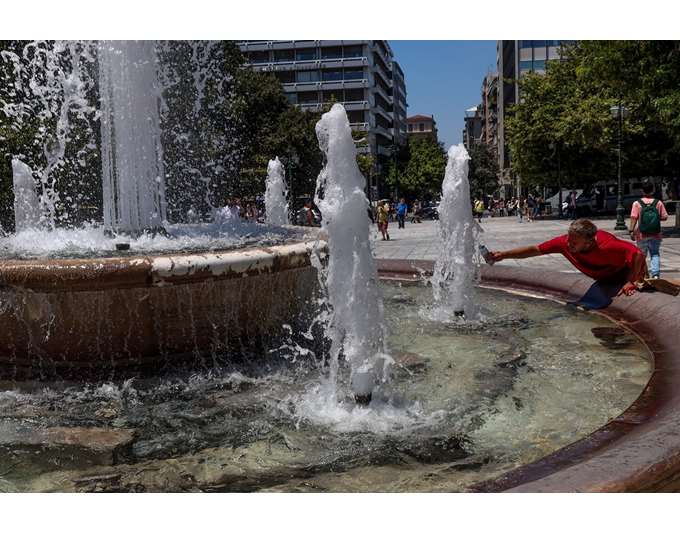
Έκτακτα μέτρα για την αντιμετώπιση της θερμικής καταπόνησης των εργαζομένων του ιδιωτικού τομέα τη Δευτέρα 7 Ιουλίου 2025 ανακοίνωσε το Υπουργείο Εργασίας και Κοινωνικής Ασφάλισης.
Ειδικότερα, ισχύουν τα εξής:
Α. Μέτρα για την αντιμετώπιση της θερμικής καταπόνησης των εργαζομένων του ιδιωτικού τομέα
Για την αντιμετώπιση της θερμικής καταπόνησης των εργαζομένων με σχέση εξαρτημένης εργασίας στον ιδιωτικό τομέα της οικονομίας, οι εργοδότες λαμβάνουν τεχνικά και οργανωτικά μέτρα προστασίας, σύμφωνα με τον ενδεικτικό και όχι περιοριστικό κατάλογο της υπ’ αριθμ. 34666/03.06.2024 εγκυκλίου, με τίτλο “Πρόληψη της θερμικής καταπόνησης των εργαζομένων” (ΑΔΑ: ΡΓ1Ν46ΝΛΔΓ-ΩΟ6).
Β. Υποχρεωτική παύση εργασιών σε υπαίθριες δραστηριότητες
Για τους εργαζόμενους επιχειρήσεων που βρίσκονται σε περιοχές, στις οποίες, σύμφωνα με τα προγνωστικά στοιχεία της Εθνικής Μετεωρολογικής Υπηρεσίας (ΕΜΥ), αναμένεται να επικρατήσουν ιδιαίτερα υψηλές θερμοκρασίες και επίπεδα δυσφορίας (WBGT) και συγκεκριμένα στις Περιφέρειες Κεντρικής Μακεδονίας, Ιονίων Νήσων, Δυτικής Ελλάδας και Θεσσαλίας, τις Περιφερειακές Ενότητες Μεσσηνίας και Σάμου, καθώς και στο ανατολικό τμήμα της Ρόδου, καθίσταται υποχρεωτική η παύση εργασιών τη Δευτέρα 07.07.2025, κατά το χρονικό διάστημα 12.00΄-17.00΄, σε χειρωνακτικές εργασίες που εκτελούνται σε εξωτερικό χώρο, όπως εργασίες σε τεχνικά και οικοδομικά έργα, εργοτάξια, ναυπηγοεπισκευαστικές ζώνες, διανομή και μεταφορά προϊόντων και αντικειμένων με δίτροχο όχημα, πατίνι, τροχοπέδιλα (delivery) κ.λπ..
Σημειώνεται ότι στις ως άνω περιπτώσεις υποχρεωτικής παύσης εργασιών εντάσσονται όλοι οι εργαζόμενοι ανεξαρτήτως του είδους απασχόλησής τους, συμπεριλαμβανομένων των ψηφιακών πλατφορμών του άρθρου 68 του ν. 4808/2021.
Στην περίπτωση που εφαρμοστεί το μέτρο της παύσης εργασιών διανομής για τις επιχειρήσεις delivery, τούτο αφορά όλες τις επιχειρήσεις που διενεργούν delivery είτε διατηρούν φυσικό κατάστημα είτε ψηφιακή πλατφόρμα.
Δύναται ωστόσο να διατηρείται ενεργή η επιλογή της παραγγελιοληψίας με παραλαβή του χρήστη απευθείας από το κατάστημα/σημείο παραλαβής (takeaway), καθώς και η ενδεχόμενη δυνατότητα εκτέλεσης της παραγγελίας με οχήματα ιδιωτικής και δημόσιας χρήσης, εκτός των κάθε μορφής δικύκλων και μοτοποδηλάτων, όπως ορίζονται στις διατάξεις του Κώδικα Οδικής Κυκλοφορίας, εφόσον αυτά διαθέτουν κλιματισμό.
Η παύση εργασιών δεν εφαρμόζεται σε οικονομικές δραστηριότητες που αφορούν σημαντικές και κοινωνικά κρίσιμες υποδομές στους τομείς της υγείας, των μεταφορών και της κοινής ωφέλειας (π.χ. υγειονομικές μονάδες, ύδρευση, ηλεκτρισμός, αεροπορικές μεταφορές, handling, θαλάσσιες, χερσαίες και σιδηροδρομικές μεταφορές), υπό την προϋπόθεση της λήψης των λοιπών τεχνικών και οργανωτικών μέτρων της υπ’ αριθμ. 34666/03.06.2024 εγκυκλίου “Πρόληψη της θερμικής καταπόνησης των εργαζομένων” (ΑΔΑ: ΡΓ1Ν46ΝΛΔΓ-ΩΟ6), συμπεριλαμβανομένης της οργάνωσης του χρόνου εργασίας.
Σε περίπτωση μη τήρησης των υποχρεώσεων της παρούσας επιβάλλεται από την Επιθεώρηση Εργασίας, σύμφωνα με τα άρθρα 23 και 24 του ν. 3996/2011 (Α’ 170), χρηματικό πρόστιμο 2.000 ευρώ ανά εργαζόμενο της επιχείρησης.
Γ. Παροχή εξ αποστάσεως εργασίας με το σύστημα της τηλεργασίας
Για εργαζόμενους με σχέση εξαρτημένης εργασίας στον ιδιωτικό τομέα που ανήκουν σε ομάδες υψηλού κινδύνου (πίνακας Παραρτήματος 2 της υπ’ αριθμ. 34666/03.06.2024 εγκυκλίου) και ειδικά στις περιπτώσεις έκθεσής τους σε επιβαρυντικές συνθήκες στις περιοχές της παραγράφου Β της παρούσας εγκυκλίου, θα πρέπει να λαμβάνεται μέριμνα από τις επιχειρήσεις, ώστε να δίνεται η δυνατότητα να εργάζονται με εξ αποστάσεως εργασία, εφόσον είναι εφικτό από τη φύση της εργασίας τους.
Δ. Έκτακτα μέτρα για την οργάνωση του χρόνου εργασίας
Για την αντιμετώπιση της θερμικής καταπόνησης των εργαζομένων στις περιοχές της παραγράφου Β της παρούσας εγκυκλίου και τη διευκόλυνση των εργαζομένων κατά την τυχόν αλλαγή χρόνου προσέλευσης και αποχώρησής τους από την εργασία, οι εργοδότες δύνανται να μην καταχωρούν εκ των προτέρων στο Πληροφοριακό Σύστημα “ΕΡΓΑΝΗ” κάθε αλλαγή της οργάνωσης του χρόνου εργασίας.
